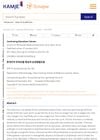 January 2013 in “Journal of The Korean Medical Association”
January 2013 in “Journal of The Korean Medical Association” The document's conclusion cannot be provided because the text is in Korean and cannot be parsed.
September 2022 in “The Korean Tea Society” Houttuynia cordata compounds may help with anti-aging and hair loss.
May 2014 in “Hanbang an'i'bi'in'hu pibu'gwa haghoeji” Low-level laser therapy is effective and safe for treating hair loss.
[object Object]  8 citations,
December 2015 in “Daehan han'yi hag'hoeji/Journal of Korean medicine”
8 citations,
December 2015 in “Daehan han'yi hag'hoeji/Journal of Korean medicine” Transtherapy significantly improved moderate to severe acne scars without side effects.
 41 citations,
December 2008 in “International Journal of Dermatology”
41 citations,
December 2008 in “International Journal of Dermatology” South Korean women with hair loss have lower hair density and thickness compared to healthy women.
 January 2012 in “Hair transplant forum international”
January 2012 in “Hair transplant forum international” The Korean Society of Hair Restoration Surgery had a successful first annual meeting.
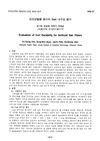 January 2007 in “Proceedings of the Korean Fiber Society Conference”
January 2007 in “Proceedings of the Korean Fiber Society Conference” New resin B makes artificial hair fibers hold curls longer than traditional resin A.
3 citations,
May 2020 in “Journal of The Korean Medical Association” Minoxidil and finasteride are effective for treating hair loss, with dutasteride showing potential but with side effects.
 40 citations,
January 2013 in “Journal of Korean Medical Science”
40 citations,
January 2013 in “Journal of Korean Medical Science” Iron deficiency may contribute to hair loss.
 9 citations,
June 2011 in “International Journal of Cosmetic Science”
9 citations,
June 2011 in “International Journal of Cosmetic Science” The new mild shampoo helped prevent hair loss in the subjects.
3 citations,
September 2021 in “Bulletin of the Korean Chemical Society” Dimeric peptide derivatives could help hair growth and treat hair loss safely.
 18 citations,
July 2011 in “Journal of The American Academy of Dermatology”
18 citations,
July 2011 in “Journal of The American Academy of Dermatology” Familial factors affect hair loss types in Koreans, with M type in men, L type in women, and paternal factors influencing male hair loss more.
 5 citations,
January 2020 in “Journal of Dermatology”
5 citations,
January 2020 in “Journal of Dermatology” Temporal hair loss relates to overall scalp hair loss in women.
 1 citations,
April 2007 in “Journal of Korean Medicine Rehabilitation”
1 citations,
April 2007 in “Journal of Korean Medicine Rehabilitation” Saengbal-eum may help hair grow on mice with removed hair.
 1 citations,
January 2019 in “Journal of The Korean Institute of Illuminating and Electrical Installation Engineers”
1 citations,
January 2019 in “Journal of The Korean Institute of Illuminating and Electrical Installation Engineers” LED light at specific wavelengths can help fight dandruff and promote hair growth without increasing inflammation.
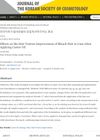 February 2021 in “Journal of the Korean Society of Cosmetology”
February 2021 in “Journal of the Korean Society of Cosmetology” Castor oil improves the texture of bleached hair by increasing its strength.
 4 citations,
September 2015 in “Bulletin of the Korean Chemical Society”
4 citations,
September 2015 in “Bulletin of the Korean Chemical Society” Researchers developed a quick and sensitive method to identify and measure hair growth-promoting substances in a herbal mix.
 1 citations,
August 2015 in “Journal of the Korean neurological association”
1 citations,
August 2015 in “Journal of the Korean neurological association” A man had a rare stroke possibly due to taking finasteride, which might have increased his hormone levels causing a blood clot. His memory loss didn't fully recover even after stopping the medication.
6 citations,
October 2006 in “International Journal of Dermatology” Hair splitting and nail detachment are linked conditions.
[object Object] March 2021 in “Iranian journal of public health”  October 2023 in “Han'gug miyong haghoeji/Journal of the Korean society of cosmetology”
October 2023 in “Han'gug miyong haghoeji/Journal of the Korean society of cosmetology” Understanding psychological discomfort in hair loss can improve treatment outcomes.
 7 citations,
January 2017 in “Journal of Clinical Biochemistry and Nutrition”
7 citations,
January 2017 in “Journal of Clinical Biochemistry and Nutrition” Higher vitamin D levels are linked to higher iron levels in Korean women without metabolic syndrome, but not in those with it.
 1 citations,
November 2015 in “Journal of Clinical Dermatology”
1 citations,
November 2015 in “Journal of Clinical Dermatology” Hair loss causes social and psychological stress, leading people to spend more on treatment, regardless of how severe the hair loss is.
Topical 5% minoxidil is safe and effective for treating hair loss in Korean men.
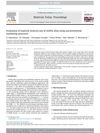 November 2020 in “Journal of The American Academy of Dermatology”
November 2020 in “Journal of The American Academy of Dermatology” Finasteride 1 mg every other month works as well as daily dose for hair loss maintenance.
The S-2 herbal extract significantly promotes hair growth.
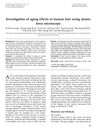 20 citations,
July 2010 in “Skin Research and Technology”
20 citations,
July 2010 in “Skin Research and Technology” Aging makes hair thinner and rougher, with less clear edges.
 5 citations,
August 2018 in “International Journal of Dermatology”
5 citations,
August 2018 in “International Journal of Dermatology” Men with sleep apnea and low iron levels are more likely to have male-pattern baldness, especially if they have a family history of hair loss.
April 2012 in “韓國藥用作物學會誌 = Korean journal of medicinal crop science” Rosa multiflora root extract promotes hair growth and prevents hair loss.
 18 citations,
May 2013 in “Journal of Dermatological Treatment”
18 citations,
May 2013 in “Journal of Dermatological Treatment” Non-ablative fractional laser treatments have a low risk of side effects in Asian patients.





















